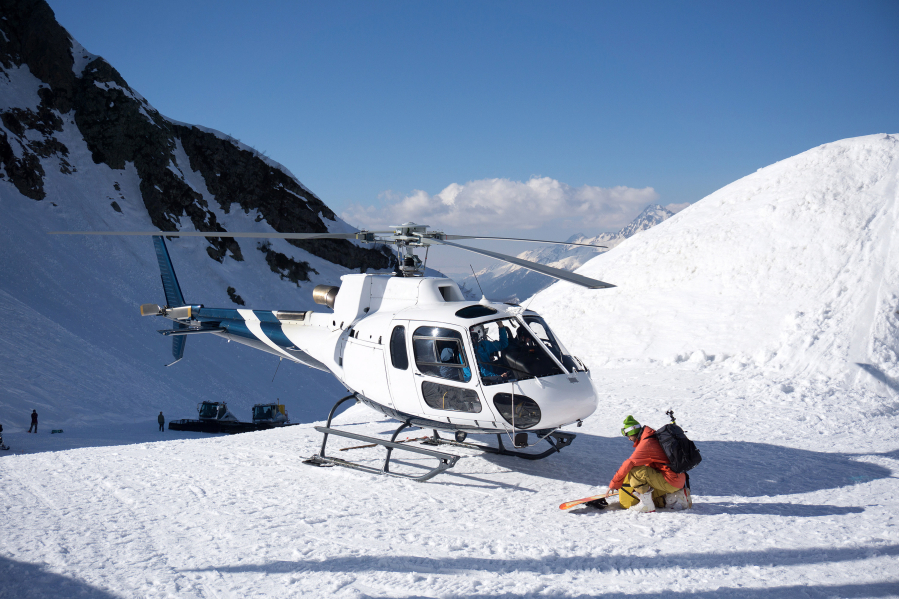SPOKANE — Rescuers plucked a cold and disoriented hiker from Mica Peak on March 17 after searching throughout the night.
The hiker started from the Liberty Lake County Park and planned to thru-hike up and over Mica Peak, ending on Radar Road, where his brother was going to pick him up, said Spokane County Sheriff’s Office deputy Philip Pfeifer, the search and rescue coordinator. That hike, if completed, is roughly 10 miles long with about 4,000 feet of elevation gain.
The hiker departed at noon and was wearing jeans, a T-shirt, tennis shoes, a stocking cap, a light windbreaker and gloves. He did not have a backpack when rescuers found him.
“He wasn’t prepared to stay the night,” Pfeifer said. “And he was soaking wet and cold when we found him.”
The hiker contacted his brother around 7:45 p.m. and told him he was lost. The brother contacted emergency dispatch and provided them with GPS coordinates and some photos. Spokane Valley firefighters responded on snowmobiles to the GPS coordinates; however, they found no one.
Pfeifer, who was coordinating the search from his truck, asked the firefighters to search in a spiral pattern from the GPS coordinates. They were unable to find tracks, he said. That prompted Pfeifer to send search and rescue volunteers up the main trails from the Liberty Lake side. Those teams were turned back by the snow.
Pfeifer sent other teams up trails on the backside of Mica Peak. Those teams eventually found footprints and followed them to the man. They found him around 6 a.m. His jeans were frozen and he was disoriented, Pfeifer said.
At the same time, Spokane County’s rescue helicopter had been on standby. Early that morning Jeff Welton, a corporal with the Spokane County Sheriff’s Office and the crew chief on the helicopter, took to the air. Initially, he said, the mission was to pick up the rescuers who had requested a flight out.
As they were flying, Welton said, Life Flight contacted the county and said they were unable to find a suitable landing spot, necessitating a hoist rescue via the county helicopter.
“They basically gave us the OK to do the hoist,” he said. “We were told there was no way he would be able to walk out.”
The man had no other injuries other than the severe cold. The helicopter lowered a medic down who assessed the man and confirmed that he wasn’t able to walk. They then hoisted him into the helicopter and flew him to the Liberty Lake Golf Course where an ambulance was waiting.
The entire episode highlights the importance of being prepared, even when hiking at a place so close to home and seemingly tame as Mica Peak. The man, who has fully recovered, won’t be charged for the rescue said Mark Gregory, spokesman for the Spokane County Sheriff’s Office.
“He did a decent thing by letting people know where he was,” Pfeifer said. “He just wasn’t prepared to stay out.”
Bring essentials
Seemingly tame expeditions can turn into full-on epics with a simple wrong turn, or a sudden gust of flame. An example? A Spokane family that went on a simple day hike only to have to spend the night out after the 2017 Eagle Creek Wildfire erupted and cut them off from returning to the trailhead.
So when hiking this spring consider bringing these dozen or so essential items:
- Map, compass and GPS phone applications. Phones are great, but as in the case of the Mica Peak rescue, if the battery dies you’re in trouble.
- Extra food and water.
- Extra clothing. Dry gloves, hat and socks could be a lifesaver if you have to spend the night out.
- Headlamp with extra batteries and a sharp knife. The headlamp will let you see. The knife could be useful for a number of things, including building a fire.
- First aid kit. If you’re on medication consider bringing extra.
- Matches in waterproof container. A lighter.
- Firestarter. Matches won’t do you any good if the weather is wet.
- Sunglasses and sunscreen.
- Signaling devices. At minimum carry a whistle rated at 100 decibels or higher. Three toots on a whistle (shots from a gun, flashes of light) are a universal signal for “I need help.” A response of one long blast of a whistle or car horn acknowledges that the signal is heard. Continue signaling to help orientate a response.
- Emergency shelter. Space blankets at a minimum.



